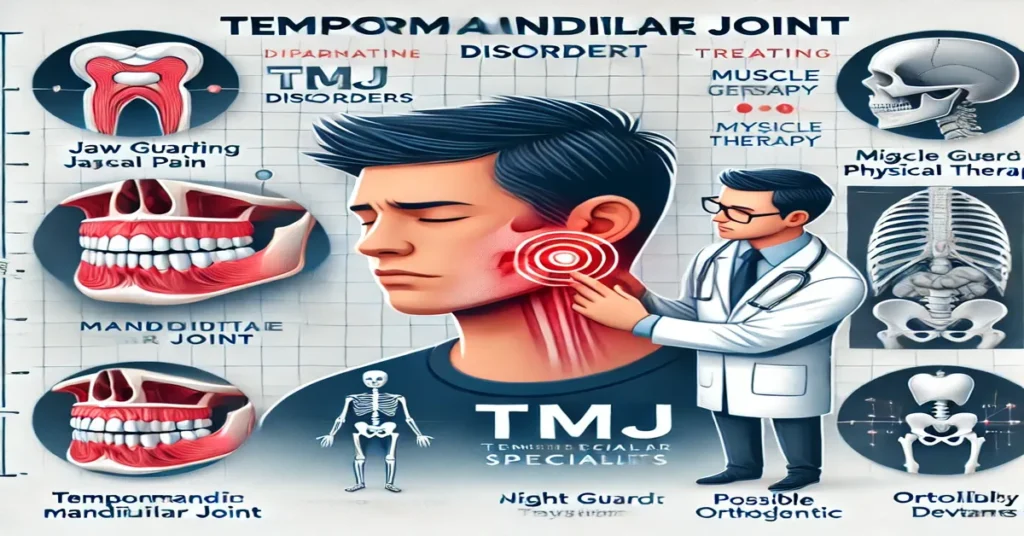Temporomandibular joint disorder (TMD or TMJ specialists near me) refers to a group of conditions that affect the temporomandibular joint, the hinge-like joint that connects the jawbone to the skull. The temporomandibular joint allows the jaw to move in various directions, enabling essential functions such as speaking, chewing, and yawning. When this joint is disrupted due to injury, misalignment, or stress, it can lead to discomfort, pain, and other symptoms that interfere with daily life.
If you are experiencing jaw pain, difficulty chewing, or other symptoms related to your TMJ, seeing a specialist can make a significant difference in your treatment. This article will provide an in-depth look at TMJ specialists, the conditions they treat, how to find a specialist near you, the diagnostic process, and the treatment options available. It will also address some frequently asked questions to help you better understand TMJ disorders and specialists’ roles in managing them.
What is TMJ (Temporomandibular Joint Disorder)?
The temporomandibular joint (TMJ) is located on either side of the face, just in front of the ears. It acts as the connection between the jaw and the skull, allowing the jaw to move up and down, side to side, and forward and backward. The joint is supported by muscles, ligaments, and tendons, and it plays an essential role in normal mouth functions such as eating, speaking, and breathing.
A TMJ disorder or TMD occurs when something disrupts the normal function of this joint, leading to pain and discomfort in the jaw, face, and surrounding areas. TMD can be caused by various factors, including:
- Injury or trauma to the jaw (such as from an accident)
- Misalignment of the teeth or jaw (malocclusion)
- Arthritis or joint inflammation
- Stress and anxiety, leading to jaw clenching or teeth grinding (bruxism)
- Jaw muscle fatigue from excessive chewing or movement
The exact cause of TMD is not always clear, and a combination of factors may contribute to its development. However, seeking care from a TMJ specialist is essential for effective diagnosis and treatment.
What Does a TMJ Specialist Do?
A TMJ specialist is a healthcare provider who focuses on diagnosing, treating, and managing temporomandibular joint disorders. These specialists often have backgrounds in fields such as:
- Dentistry: Dentists with advanced training in TMJ-related conditions often specialize in treating TMD. These specialists are familiar with how dental issues, such as teeth misalignment or bite problems, can contribute to TMJ pain.
- Otolaryngology (ENT): Some TMJ specialists are ear, nose, and throat doctors (ENTs), who address issues with the head, neck, and jaw. These specialists may focus on TMD caused by structural problems in the jaw or neck area.
- Orthodontics: Orthodontists can help address bite misalignments that may contribute to TMD. Some orthodontists undergo additional training to specialize in treating TMJ disorders.
- Physical Therapy: Physical therapists with expertise in TMJ disorders help patients manage and alleviate jaw and neck pain through exercises, stretches, and other therapeutic techniques.
In some cases, a combination of specialists may be necessary to provide a comprehensive treatment plan for managing TMD.
Common Symptoms of TMJ Disorders
The symptoms of a TMJ disorder can vary widely from person to person. Some individuals may experience mild discomfort, while others may suffer from more severe symptoms that affect their daily activities. The most common symptoms include:
- Jaw Pain: Pain or tenderness in the jaw joint, especially when chewing or opening the mouth wide.
- Clicking or Popping Sounds: Audible sounds when opening or closing the mouth may indicate a misalignment of the joint.
- Locking of the Jaw: In some cases, the jaw may “lock,” making it difficult to open or close the mouth fully.
- Headaches: TMJ disorders can cause tension headaches or migraines due to muscle strain in the jaw, neck, and head.
- Ear Pain: Pain in or around the ears, including a feeling of fullness or pressure, may occur, as the TMJ is close to the ear canal.
- Neck and Shoulder Pain: TMJ-related muscle tension can lead to discomfort in the neck and shoulders.
- Difficulty Chewing or Speaking: When the jaw is misaligned or painful, everyday activities like chewing food or speaking can become challenging.
If you experience any of these symptoms, particularly if they persist for an extended period, it is important to consult a healthcare provider who specializes in TMJ disorders to receive a proper diagnosis and treatment plan.
How to Find a TMJ Specialist Near Me
Finding a qualified TMJ specialist near you is the first step toward getting the proper treatment for your TMJ disorder. Here are some strategies to help you locate a specialist:
1. Ask Your Primary Care Doctor or Dentist
Your primary care doctor or dentist can provide a referral to a TMJ specialist. These healthcare providers are often familiar with specialists in your area and can help guide you toward the right provider based on your needs.
2. Search Online Directories
Several medical and dental associations maintain online directories of TMJ specialists. These directories can help you find providers near you:
- American Academy of Orofacial Pain (AAOP)
- American Association for Dental Research (AADR)
- American Academy of TMJ and Orofacial Pain (AATMD)
3. Research Local Orthodontists or Dentists
Many orthodontists and general dentists are trained in TMJ diagnosis and treatment. Look for dental offices or orthodontic practices that specifically mention treating TMD as part of their services.
4. Consider a Multidisciplinary Approach
Since TMD may involve dental, muscle, and joint issues, it may be helpful to find a multidisciplinary TMJ specialist. These professionals may include a team of doctors, physical therapists, and dentists who work together to treat your condition.
5. Read Patient Reviews
Once you’ve identified potential specialists, take the time to read patient reviews or testimonials. Reviews can provide insight into the specialist’s approach to care, their success in treating TMD, and their ability to make patients feel comfortable.
6. Check for Insurance Coverage
Before making an appointment, verify that the specialist accepts your health insurance plan. This can help prevent unexpected out-of-pocket costs and ensure that you have access to affordable treatment.
Diagnosis of TMJ Disorders
The diagnosis of TMJ disorders typically begins with a thorough evaluation by a specialist. The diagnostic process includes:
- Medical History: The specialist will ask about your symptoms, medical history, and any past jaw injuries or dental treatments that may contribute to TMD.
- Physical Examination: The doctor will examine your jaw and face for signs of swelling, tenderness, or clicking. They may also check your bite and the way your teeth align.
- Imaging: Depending on the severity of the disorder, the specialist may recommend imaging tests, such as X-rays, MRI scans, or CT scans, to visualize the jaw joint and assess any structural issues or damage.
- Bite Analysis: In some cases, the specialist will analyze how your teeth come together (your bite) and check for misalignments that could be contributing to the TMD.
Based on these diagnostic steps, the TMJ specialist will develop a treatment plan tailored to your specific condition.
Treatment Options for TMJ Disorders
Treatment for TMJ disorders depends on the severity of your symptoms and the underlying causes of the condition. options include:
1. Conservative (Non-Surgical) Treatments
- Pain Management: Over-the-counter pain medications (e.g., ibuprofen) can help alleviate discomfort.
- Heat and Cold Therapy: Applying warm compresses or cold packs to the jaw can help reduce pain and inflammation.
- Physical Therapy: A physical therapist can guide you through exercises and stretches to strengthen the jaw muscles, improve flexibility, and reduce pain.
- Splints and Night Guards: These dental appliances help alleviate teeth grinding (bruxism) and jaw clenching, which can contribute to TMJ pain.
- Stress Management: Relaxation techniques, such as yoga, meditation, or biofeedback, can help reduce stress and muscle tension.
2. Orthodontic Treatment
If misalignment of the teeth is contributing to TMD, an orthodontist may recommend braces or other devices to realign the teeth and correct the bite.
3. Injections and Medications
- Botox Injections: In some cases, botulinum toxin (Botox) injections may be used to relax the jaw muscles and reduce pain caused by muscle spasms.
- Steroid Injections: Corticosteroid injections into the TMJ can help reduce inflammation and pain in the joint.
4. Surgical Treatment
Surgery is typically considered a last resort when other treatments have not provided relief. Surgical options include:
- Arthroscopy: A minimally invasive procedure where a small camera is inserted into the joint to remove damaged tissue or realign the joint.
- Open Joint Surgery: In severe cases, traditional surgery may be required to repair or replace the TMJ.
Conclusion
TMJ disorders can significantly impact a person’s quality of life, but with the help of a qualified TMJ specialist, relief is possible. Whether you experience mild discomfort or severe pain, a specialist can provide an accurate diagnosis and develop a customized treatment plan tailored to your needs. Early intervention is key to managing TMJ disorders effectively, so it is important to seek help as soon as you notice symptoms.
By understanding what TMJ specialists do, how to find one near you, and the treatment options available, you can take proactive steps toward improving your jaw health and achieving lasting relief from TMJ pain.
FAQs About TMJ Specialists
- How do I know if I need to see a TMJ specialist? If you experience jaw pain, headaches, clicking or popping sounds, or difficulty chewing, it may be time to see a TMJ specialist.
- What kind of treatment do TMJ specialists provide? TMJ specialists offer a range of treatments, including pain management, physical therapy, bite correction, and in some cases, surgical interventions.
- Can TMJ disorders be cured? While TMJ disorders may not always have a complete cure, many treatments can help manage symptoms and improve quality of life.
- How long does TMJ treatment take? The duration of treatment varies depending on the severity of the disorder and the treatment approach. It can range from a few weeks to several months.
- Are TMJ treatments covered by insurance? Many insurance plans cover the cost of TMJ treatments, but it is essential to check with your provider to determine what is covered under your plan.
- Can stress cause TMJ disorders? Yes, stress can lead to jaw clenching and teeth grinding, both of which are common contributors to TMJ disorders.







